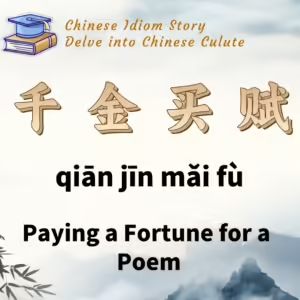
Chinese Idiom: 家书抵万金 (Jia Shu Di Wan Jin)
English Translation: A family letter is worth ten thousand gold
pīn yīn: jiā shū dǐ wàn jīn
Idiom Meaning: This idiom metaphorically highlights the preciousness of family letters, emphasizing that receiving news from home during difficult times is incredibly valuable, as if it were worth a fortune.
Historical Source: Spring View (《春望》) by the Tang Dynasty poet Du Fu.
Idiom Story:
In June 756, after the rebel army led by An Lushan captured Chang’an, Emperor Xuanzong of Tang fled to Chengdu. In July, Emperor Suzong ascended the throne in Lingwu (modern-day Ningxia), relying on the military support of Guo Ziyi and Li Guangbi to combat the rebel forces.
In October of the same year, Prime Minister Fang Guan led an army to meet the rebel general An Shouzhong in the area of Xi’an. Fang Guan, a scholar unfamiliar with warfare, faced a disastrous defeat, resulting in over 40,000 casualties. At this time, Du Fu was trapped in Chang’an, deeply pained by the government’s failure. This emotional turmoil inspired him to write the poem Sadness for Chen Tao (《悲陈陶》), capturing his sorrow at the tremendous loss of life.
The poem vividly describes the aftermath of the battle, reflecting on the bloodshed and despair as families mourned their lost loved ones. The line of Du Fu’s later poem Spring View captures the essence of his grief:
“烽火连三月,家书抵万金。”
(The beacon fires have burned for three months, and a family letter is worth ten thousand gold.)
In this context, the phrase underscores the profound value of a letter from home amidst the turmoil of war and separation. Du Fu poignantly expresses that despite the beauty of spring returning to Chang’an, the emotional weight of loss and the longing for news from his family make any correspondence priceless. The imagery of his thinning hair reflects the toll that anxiety over the state of his country and family has taken on him, illustrating the deep connection between personal loss and national tragedy.
Thus, the idiom “家书抵万金” conveys not only the emotional significance of family letters but also the overarching themes of love, loss, and the yearning for peace in times of strife.






